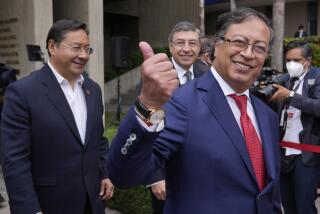Media : Yugoslavia’s Press Feeds On Political, Social Bitterness : A fight is brewing about the role of newspapers and TV. National leaders want fairness but the republics seem intent on manipulating them for their own interests.
BELGRADE, Yugoslavia — When the northern Yugoslav republic of Slovenia broke from the Communist yoke earlier this year and called the country’s first free elections since World War II, the Serbian daily Politika denounced Slovenes as “fascists and traitors.”
In slightly less venomous tones, Slovenia’s most influential newspaper, Delo, accused Serbia of seeking to impose Stalinist rule over the rest of Yugoslavia.
And when the Albanian-language daily Rilindja reported on a campaign to upgrade the political status of the Serbian province of Kosovo, authorities in Belgrade closed the newspaper and sent troops into its offices in Pristina.
While Yugoslavia has managed to avoid outright civil war since the 1940s, these are just a few examples of how long-suppressed nationalist hostilities are vented daily on the airwaves and pages of its manipulated media.
The vitriolic attacks pit Serbs against Croats and Slovenes, nationalists against federalists, and Christians against Muslims--the same political and social battle lines threatening to split Yugoslavia apart into the fractious Balkan states that existed before World War I.
A holdover from decades of one-party rule, most of Yugoslavia’s newspapers, magazines and broadcast networks remain in the hands of local political leaders.
Communists who still rule by monopoly in Serbia and other republics use the media as instruments for political proselytizing and maintaining their grip on power.
In Slovenia and Croatia, where free elections voted in non-Communist leaders earlier this year, authorities have begun the difficult process of reforming the organs of information. But results will be a long time in coming.
Politicians in the Slovenian governing alliance complain that the knee-jerk reaction of Delo is to resist democratic change.
Croatia’s new leader, Franjo Tudjman, has launched a campaign to weed out editors seeking to undermine his republic’s new democratic government. But the transformation awaits a new media policy that parliamentarians are still struggling to define.
Holding what passes for a media middle ground in Yugoslavia is the federal government daily Borba, which has managed to operate with relative autonomy under Prime Minister Ante Markovic.
The federal leadership that rose to power last year has promoted pluralism and independence of the state-funded press. Serbian Communists announced in mid-July that their renamed party will also seek to establish a free press. However, republic President Slobodan Milosevic heads the new party, and his ultranationalist views are not expected to foster much reform.
A glance at any of Serbia’s 11 dailies vividly illustrates the enormous obstacles faced by the few officials who place unity of the federation above the concerns of individual republics.
Yugoslavia’s media have succumbed to nationalist prejudice because republic leaders control the purse strings, said Slavko Curuvija, a senior editor and writer at Borba.
“Our republic press shares the positions of the political structures that are in power. They cannot imagine operating outside of official sanction,” Curuvija said. “We lack the advertising community and independent financing that exists in the United States and other countries where the press is independent.”
Conscripted into battle for the issues dominating republic politics, the regional newspapers reflect official policy in each of the widely divergent republics.
One of the most poignant illustrations of friction among the republics has been the war of words over Kosovo, the traditional heartland of the kingdom of Serbia and now populated mostly by ethnic Albanians.
Politika, Yugoslavia’s oldest newspaper and until two years ago its most respected, jumped on the Serbian nationalist bandwagon in 1988, when it became the chief vehicle of propaganda in Milosevic’s campaign to wrest control of Kosovo from the Albanian majority.
The newspaper and a sister publication, Ekspres Politika, have been replete with unattributed allegations that Kosovo is the victim of a plot by neighboring Albania to steal the sacred territory from Serbia.
Unsigned letters to the editor contend that agents of Tirana’s Sigurimi secret police force slip across the mountainous border to Kosovo to plunder its natural resources and stir up secessionist sentiments among Yugoslav Albanians, who account for nearly 90% of Kosovo’s 2 million residents.
“No matter how much they have been indoctrinated with hatred, it is beginning to dawn on certain shiptars (a derisive name for Albanians) that continuing hardheaded opposition to all things Serbian can only cause them further troubles,” Ekspres Politika stated in an ostensibly objective report in mid-July.
The newspaper reported without attribution in March that Albanian “separatist mercenaries” were firing mortars and bazookas at Serbian police--an inflammatory charge the police themselves dismissed as false.
In reporting on events elsewhere in Serbia, Politika casts pro-democracy opposition parties as havens for “hooligans and bullies.”
Several Serbian dailies have alleged that Croatia’s new democratic government plans to dress police in uniforms evocative of the black garb of wartime Ustashi units--pro-Nazi, fascist forces said to have killed more than 1 million Serbs, Jews and Gypsies.
The Croatian Interior Ministry has repeatedly denied any such plan, and Croatian newspapers have in turn accused Serbia of trying to incite rebellion among the 530,000 Serbs living in Croatia.
Another telling episode in the drama of political meddling in the media is the blatant attempt by Communist authorities to keep opposition views off the air.
For 13 years, the independent Studio B radio network has been fighting to win a license for a television station that would be free of Serbian censorship. The effort has been repeatedly thwarted by the predominantly Serbian federal regulatory agency.
Yet Politika managed to launch a new television offshoot this month, after only 13 days, opening yet another outlet for its rantings against perceived Serbian enemies.
Denouncing the Belgrade media’s focus on the issue of who should run Kosovo, Delo lamented recently that “the country has almost become Serboslavia!”
More to Read
Sign up for Essential California
The most important California stories and recommendations in your inbox every morning.
You may occasionally receive promotional content from the Los Angeles Times.











